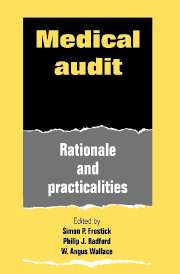Book contents
- Frontmatter
- Contents
- List of contributors
- Foreword
- Foreword
- 1 Introduction
- 2 Audit: historical and future perspectives
- 3 Audit philosophy
- 4 Medical audit: a view from the centre
- 5 Audit: a view from the Royal College of Surgeons of England
- 6 The regional viewpoint
- 7 Medical audit: the needs of the District Health Authorities
- 8 Resource management and budget holding
- 9 Unit and district information systems
- 10 Read codes and medical audit
- 11 Data capture direct from doctors
- 12 Computer systems: practice, limitations and pitfalls
- 13 Paediatric audit
- 14 Audit in obstetrics and gynaecology
- 15 Audit in general surgery
- 16 Orthopaedic audit: guidelines and hints
- 17 Installing audit in general practice and general dental practice
- 18 Clinical audit in psychiatry. Models for audit in mental health
- 19 Audit in anaesthesia
- 20 Audit in intensive care
- 21 Medical audit: lessons from the USA
- 22 Quality control in health care: the Dutch experience
- 23 Medical audit: experience from Sweden
- 24 Performance indicators
- 25 Measuring outcome and quality control
- 26 Audit: will it work?
- 27 What has been achieved so far?
- 28 A practical guide to audit
- Index
5 - Audit: a view from the Royal College of Surgeons of England
Published online by Cambridge University Press: 30 September 2009
- Frontmatter
- Contents
- List of contributors
- Foreword
- Foreword
- 1 Introduction
- 2 Audit: historical and future perspectives
- 3 Audit philosophy
- 4 Medical audit: a view from the centre
- 5 Audit: a view from the Royal College of Surgeons of England
- 6 The regional viewpoint
- 7 Medical audit: the needs of the District Health Authorities
- 8 Resource management and budget holding
- 9 Unit and district information systems
- 10 Read codes and medical audit
- 11 Data capture direct from doctors
- 12 Computer systems: practice, limitations and pitfalls
- 13 Paediatric audit
- 14 Audit in obstetrics and gynaecology
- 15 Audit in general surgery
- 16 Orthopaedic audit: guidelines and hints
- 17 Installing audit in general practice and general dental practice
- 18 Clinical audit in psychiatry. Models for audit in mental health
- 19 Audit in anaesthesia
- 20 Audit in intensive care
- 21 Medical audit: lessons from the USA
- 22 Quality control in health care: the Dutch experience
- 23 Medical audit: experience from Sweden
- 24 Performance indicators
- 25 Measuring outcome and quality control
- 26 Audit: will it work?
- 27 What has been achieved so far?
- 28 A practical guide to audit
- Index
Summary
Introduction
The Royal College of Surgeons of England (RCS) derives its authority for the training of surgeons and the regulation of surgery from the charter given by George III under the Great Seal of England on 22nd March 1800. A further charter bestowed by Victoria in 1843 empowered the RCS to make by-laws concerning the activities of its fellows. Since then the RCS has constantly sought to improve the selection and training of surgeons and the standards of surgery in England and Wales. The scope of the RCS remit has recently been increased and refined by the changes in medical practice that will flow from the Government White Paper ‘Working for Patients’. These changes, enacted as law from 1st April 1991, and the National Health Service and Community Care Act 1990, delegate to the Royal Colleges a central role in quality assurance. For surgery this task falls to the RCS in respect of surgical care in England and Wales.
The RCS has always conducted examinations for surgeons, indeed possession of the FRCS diploma is a prerequisite for autonomous practice as a surgeon in the National Health Service. As an extension of these examinations the RCS has prescribed conditions for apprenticeship and training.
- Type
- Chapter
- Information
- Medical Audit , pp. 37 - 54Publisher: Cambridge University PressPrint publication year: 1993
- 1
- Cited by



